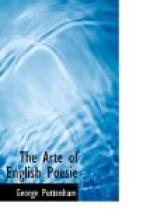CHAP. II.
That there may be an Art of our English Poesie, as well as there is of the Latine and Greeke.
Then as there was no art in the world till by experience found out: so if Poesie be now an Art, & of al antiquitie hath bene among the Greeks and Latines, & yet were none, vntill by studious persons fashioned and reduced into a method of rules & precepts, then no doubt may there be the like with vs. And if th’art of Poesie be but a skill appertaining to vtterance, why may not the same be with vs as wel as with them, our language being no lesse copious pithie and significatiue then theirs, our conceipts the same, and our wits no lesse apt to deuise and imitate then theirs were? If againe Art be but a certaine order of rules prescribed by reason, and gathered by experience, why should not Poesie be a vulgar Art with vs as well as with the Greeks and Latines, our language admitting no fewer rules and nice diuersities then theirs? but peraduenture moe by a peculiar, which our speech hath in many things differing from theirs: and yet in the generall points of that Art, allowed to go in common with them: so as if one point perchance which is their feete whereupon their measures stand, and in deede is all the beautie of their Poesie, and which feete we haue not, nor as yet neuer went about to frame (the nature of our language and wordes not permitting it) we haue in stead thereof twentie other curious points in that skill more then they euer had, by reason of our rime and tunable concords or simphonie, which they neuer obserued. Poesie therefore may be an Art in our vulgar, and that verie methodicall and commendable.




